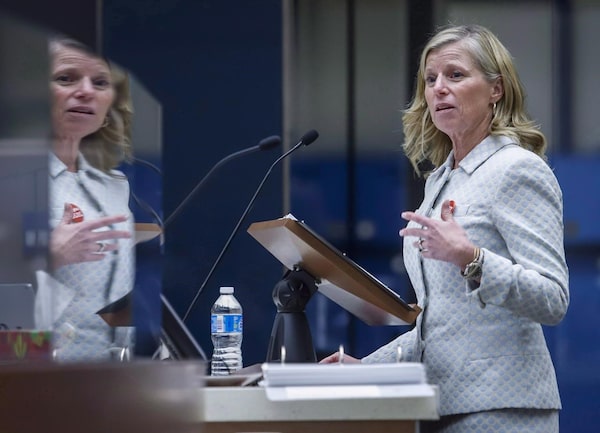
Calgary 2026 Bid Corporation CEO Mary Moran delivers technical elements of its plan for the 2026 Olympic and Paralympic Winter Games to Calgary City Council, in Calgary on September 11, 2018.Jeff McIntosh/The Canadian Press
President and CEO, Calgary Economic Development
Widespread and rapidly accelerating technological innovations are disrupting business everywhere and transforming all sectors of the economy. It is an economic environment teeming with opportunity, but also characterized by volatility, uncertainty, complexity and ambiguity.
The new economy poses a collective and individual challenge. Collectively, we need to nurture talent from all backgrounds to drive the technological transformation. Individually, we need to embrace lifelong learning.
We have a skills gap we must address by strengthening our digital literacy and critical thinking or we risk missing out on opportunities in the new economy as cities, provinces and a country. The “talent pipeline” is now part of our critical infrastructure in Canada.
I recently participated in the global “CEO x 1 Day” mentorship program run by executive search firm Odgers Berndtson. It is an initiative that matches top postsecondary students with CEOs for a day of job shadowing, mentorship and – something I found to be particularly valuable – reverse mentoring.
As an economic developer, I thought the chance to better understand what drives the next generation of leaders was too good to pass up. Our postsecondary institutions are seed planters for economic development – nurturing both talent and ideas. And they’re accelerators of economic growth.
The student I was matched with, Tingting Yan, is completing her bachelor of health sciences degree at the University of Calgary. She is a pre-med student with ambitions in business and is also founder of Humans of UCalgary, a medium to share the diverse perspectives of the campus community.
Aside from her inquisitive mind, Tingting’s commitment to helping people was evident throughout our day together. It reinforced my appreciation of this generation of emerging leaders motivated to make positive impacts in their organizations and communities with far-reaching societal benefits.
This commitment to making a difference resonates strongly with millennials and is a quality that would benefit us all. We need entrepreneurs to embrace innovation and technology to address the world’s biggest challenges – cleaner energy, safe and secure food, better health solutions and safe movement of goods and people.
The day Tingting joined us, I gave a speech at St. Mary’s University in Calgary. It focused on the need for job-ready digital citizens, critical thinking and transferable skills in an evolving workplace. Calgary’s economic development organization works to recruit catalytic companies and individuals, retrain highly skilled workers displaced when the energy sector restructured and retain graduates from our postsecondary institutions. Developing this pipeline of talent and opportunity is critical across Canada.
I’ve long been an advocate of linking education and work experience. It’s my message to students, new grads and anyone in the work force – we must all commit to lifelong learning given the incredible pace of change in the world.
Adaptability may now be your most valuable ability. Be the disruptor, not the disrupted.
We are at an economic crossroads in Calgary; and so is much of the world. The bridge between people and technology is increasingly vital to economic progress. The good news is the solutions to our challenges can come from us. However, like never before, that means all of us.
One thing in particular stuck with me from my day with Tingting. To prosper in the new economy, we need to disregard inconsequential things such as age, gender, ethnicity, sexual orientation or family connections and engage everyone who has an ability to contribute to solutions.
A 2017 Globe and Mail article on why workplace diversity depends on engaging millennials, by Odgers Berndtson partners, said that “cultivating the future leaders of Canada will require a more inclusive and flexible approach to talent. This will not only lead to more innovative and positive economic outcomes, this is also our best shot at finally achieving a diverse work force where everyone has an opportunity to thrive.”
I would take it a step further to say an inclusive and flexible approach to business is our best shot at achieving a diverse and vibrant economy where everyone has an opportunity to thrive.
Executives, educators and human resources experts contribute to the ongoing Leadership Lab series.
Stay ahead in your career. We have a weekly Careers newsletter to give you guidance and tips on career management, leadership, business education and more. Sign up today.